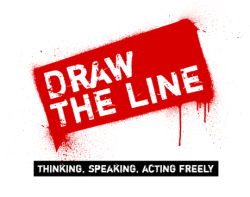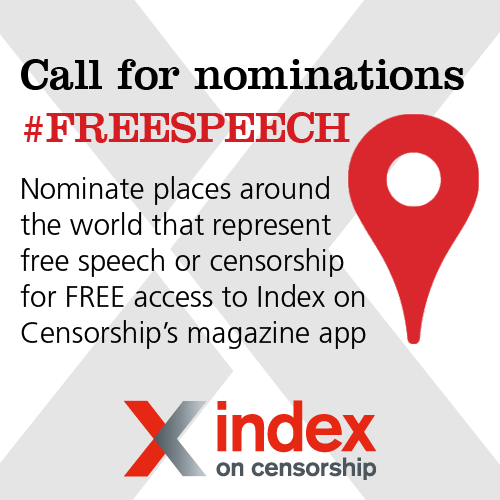11 Sep 2014 | Draw the Line, Youth Board

Free expression and policing can have an antagonistic relationship. Recent events in Ferguson are demonstrative of the issues that arise as the demands for protest clash with those for civil safety.
The police are naturally drawn to the forefront of such a debate as they become the physical manifestation of a state’s commitment to free expression and the right to protest. Thus, as the Obama administration launches a federal investigation into whether the Missouri police systematically violated the civil rights of protesters, it is prescient to ask whether one can demand more of the police to protect free expression.
Undoubtedly, enforcement agencies across the world play a tricky role in facilitating expression while protecting the legitimate safety concerns of the local community. Between 2009 and 2013, police in England spent £10 million on security arrangements for EDL marches. There can also be a huge social cost to galvanic protest and the director of Faith Matters, Fiyaz Mughal, has called for a ban on such marches, claiming that “[We] know there is a corrosive impact on communities, it creates tensions and anti-Muslim prejudice in areas. I think enough is enough. I think a banning order is necessary with the EDL”.
What the recent altercations in Ferguson illustrates is that the role of the police in safeguarding free expression must not be overlooked. More importantly, this is a global issue and as six activists being retried for breaching Egypt’s protest law have started an open-ended sit-in and hunger strike it must be remembered that this debate truly gets to the heart of the basic demands of any civic society.
As scenes from Ferguson have at times resembled the images of police crackdowns in Cairo it is clear that complacency about such issues can prove disastrous. It therefore seems vital to drawn certain lines as to where we feel the police should stand when it comes to creating the basis of a safe but also free society.
This article was posted on 11 Sept 2014 at indexoncensorship.org
8 Sep 2014 | Magazine, News and features

We want to offer free access to Index on Censorship magazine’s ipad or iphone app from a symbolic place that represents freedom or censorship anywhere around the world – and we are calling on you to nominate your choice.
Suggest a symbolic place for censorship or freedom – from Speakers’ Corner in London to Egypt’s Tahrir Square – and if we opt for your suggestion, we will unlock the app so readers standing on that spot will get free access for one year.
Download the free taster app today here
What you need to do:
1) Pick a global location that’s associated with free speech or censorship
2) Tweet your nominated location to @Index_Magazine using hashtag #FREESPEECH before 30 September 2014. Follow @Index_Magazine if you are not already a follower.
3) Selected locations announced on 22 October 2014, with free access to Index on Censorship Magazine app immediately available for one year
* Winning locations picked by Index on Censorship magazine team
** Free app access available at winning locations until 1st September 2015
*** Information on the Index on Censorship magazine app here
7 Aug 2014 | Europe and Central Asia, News and features, Turkey

Turkish Prime Minister Recep Tayyip Erdogan (Photo: Philip Janek / Demotix)
Shortly before campaigning for Turkey’s upcoming presidential election was officially set to begin, the director of public broadcaster TRT threatened to cut coverage of candidate Selahattin Demirtas. The reason? Demirtas had publicly criticised TRT for bias towards one of the three men in the running — outgoing Prime Minister Recep Tayyip Erdogan.
The case, reported by Index on Censorship’s media freedom mapping tool, is just one example of the challenges facing free expression in Turkey on eve of a vote that could alter its political system. When Turks go to the polls on Sunday, it will be in the country’s first direct presidential election. The consensus is that Erdogan will beat his opponents — Dermitas from the left wing People’s Democratic Party and Ekmeleddin Ihsanoglu, representing the centre-left Republican People’s Party and the far-right Nationalist Movement Party — comfortably; some predict after just one round. But what makes this election even more significant, is Erdogan’s declared intention to transform the presidency from a largely ceremonial role to a powerful office based on the US model. This would effectively allow him to remain in power despite being barred from re-election as prime minister by term limits.
Concerns have been raised about the impact of the state of free expression in Turkey on the election. The Organisation for Security and Cooperation in Europe (OSCE), in its capacity as an election observer, recently stated that “direct interference of media owners and political actors into editorial freedom results in a lack of independent and investigative journalism and leads to limited criticism towards the ruling party and the prime minister”. The interim report from its election observation mission published on 31 July, also highlighted shortcomings in the legal framework around impartiality of media coverage and the the country’s restrictive internet legislation.
This is at least in part backed up by Demirtas’ claims. According to research from Turkey’s broadcasting regulator, between 4 and 6 July, TRT gave 533 minutes worth of coverage to Erdogan, compared to 3.24 seconds for Ihsanoglu and 45 seconds to Demirtas. Erdogan has also been accused of blurring the lines between his role as prime minister and presidential candidate, and using resources and platforms exclusively available to him to rally support. The campaigns of Erdogan’s opponents “have been active, but with limited visibility”, as the OSCE put it.
Other recent media freedom cases go beyond questions of impartiality. Released just days before the election, a report by Bianet, a Turkish news site that monitors attacks on press freedom, showed that assaults on journalists is on the rise. As covered by Index, the research found that between April and June, there had been 54 attacks on journalists — between January and March, the figure was “at least” 40. The report also noted that 133 fines were handed out to various TV and radio institutions and continued impunity around attacks on the media. This follows the pattern of Turkey’s global press freedom ranking, which has deteriorated over the past years.
Internet freedom has also been dealt some blows in the lead-up to the election. The latest Twitter transparency report, published last week, showed that Turkey has submitted the highest number of content removal requests in the past six months — despite the fact that Twitter was banned in Turkey for two weeks in March and April. The social media platform has been used by many of the country’s 36 million internet users to have their say on political matters, most notably during last summer’s Gezi park protests — a topic Turkish playwright Meltem Arikan has written about extensively for Index.
More recently, Turkish social media was flooded with photos of grinning women, in protest at Deputy Prime Minister Bulent Arinc declaring that women shouldn’t laugh out loud in public. While the bans on Twitter and later also YouTube were short-lived, authorities continue to keep close tabs on the internet. Twitter user @fuatavni, who has almost one million followers, was blocked in Turkey after criticising the government. Earlier in July, Erdogan filed a legal complaint against the editor of Today’s Zaman, Bulent Kenes, over what he claimed were insulting tweets. This comes in the wake of controversial legislation passed in February, which gives the government wide-reaching powers in regulating the internet.
More about Turkey from mediafreedom.ushahidi.com:
Newspaper Agos, film director threatened on Twitter
News crew told to leave public event attended by minister
Greek daily newspaper in Istanbul closes
Broadcaster threatens to stop covering presidential candidate
Prime Minister files legal complainst against newspaper editor
This article was published on August 7, 2014 at indexoncensorship.org
7 Jul 2014 | Draw the Line, Events, Young Writers / Artists Programme
As cheers from the World Cup rumbled in the background, Index set up an online platform to debate the tussle between sport and freedom of speech. As part of the Draw the Line series of discussions, last month’s question was: Should repressive regimes be banned from sport? If countries have poor human rights record, do they deserve to participate?
Twitter erupted with opinions. Immediately the question of defining a repressive regime was raised – whose duty would it be to decide? Although many might agree that Iran’s government-controlled press was anti-free speech, would the US’s treatment of whistleblower Edward Snowden fall into the same category?
Others argued that banning offending countries would leave their crimes in the shadows. Instead they believed oppressive regimes should suffer the spotlight of global media – hoping that the publicity would encourage conversation and spark change.
Opinions seemed split at the first Draw the Line event, where ten young human rights activists gathered to discuss the same issue. Although some declared passionately that repressive regimes must be punished, there were fears that a ban would misdirect that punishment – affecting a country’s people rather than its leaders.
Defining the World Cup’s worst countries for free speech – or the “group of death” – seemed to make a much easier task for the young activists. Examining democracy, civil liberties, press regulations, internet freedom and corruption, participants unanimously decided that Cameroon, Iran, Nigeria and Russia qualified as the countries that held freedom of speech in the lowest regard.
As the debate evolved, a common consensus emerged: A campaign should be set up to stop countries that stifle free speech from hosting high profile sports events, like the world cup. With host countries benefiting from huge boosts to the economy, infrastructure and community spirit, this should be incentive enough to halt human rights abuses without punishing innocent citizens by banning countries completely.
More about Draw the Line



